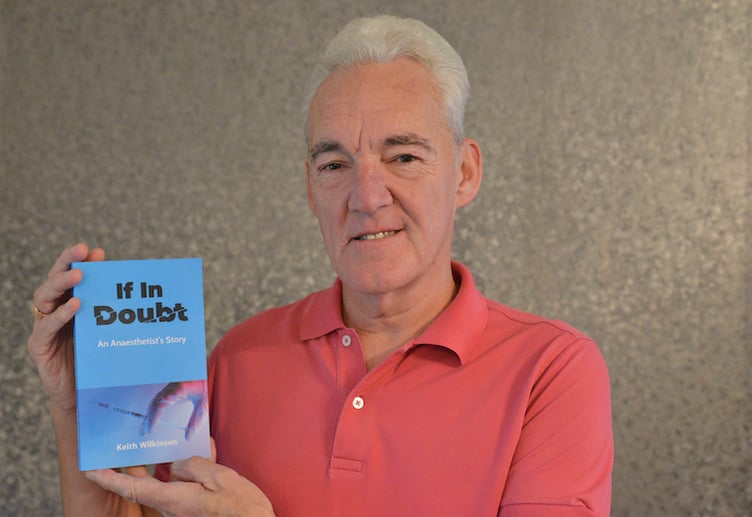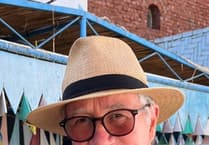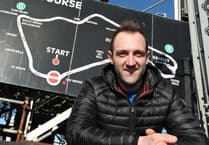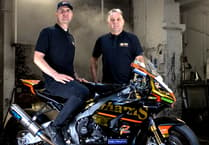Keith Wilkinson worked as an anaesthetist at Noble’s Hospital for 30 years and over that time he has collected vast range of stories and anecdotes, some intriguing, others harrowing. Having retired last year, and as author of another well-known book on true crime, Manx Murders, the Glen Vine resident said that he decided to put his experiences to paper to give him something to do in retirement.
In the book he aims to give people an insight into what goes on behind the scenes in the operating theatre, and answer pressing questions such as "What if I wake up in the middle of the operation?’ or "What if I die during surgery?"
Originally from Stanley, County Durham, Keith, 65, first came to the island in 1982 after completing his medical training in Liverpool.
It was here where he took his first hospital posting as a junior doctor and then met his Manx wife.
He writes about these early experiences in the first part of his book, explaining that he then decided he wanted to specialise in anaesthesiology.
’I just liked it, being your own boss, not having to go on long ward rounds, [or] do clinics and dictate letters and all that stuff,’ Keith said.
’It’s interesting. Every day’s different and you get involved in all different parts of the hospital --you’re in A&E, you’re in operating theatres, ICU, or obstetric units, and so on.’
Another factor which motivated him was an incident which he saw happen while he was a house officer at Noble’s when a patient in ICU died.
An anonymised version of this is recounted in the book.
’Basically, they lost the airway in ICU - the tube came out,’ Keith explained.
’And I got called in, and I thought "hang on, get the tube back in!" - and the anaesthetist just stood there, he wasn’t doing anything - the nurse was shouting at him.
’The patient just [cardiac] arrested and died.
’And I think she would have died anyway, but the anaesthetist messed it up to be honest.
’So that was another thing that made me think - if I’d been the anaesthetist, I don’t know if I’d have saved the patient, but I would have done a bit better job than him.’
’I’d only been qualified for a few weeks, but even I knew what he should have done, but he didn’t do it.’
Keith said the most rewarding parts of his career were his work in the Hospice and palliative care - providing pain relief to make patients as comfortable as possible at the end of their lives.
He has also written much about his work in ICU with trauma cases.
’If the patient does well, when they had been expected to die - when you’re part of the team that gets them through it, that’s very rewarding too,’ he said.
’But I’ve seen loads of awful trauma cases, and some horrible head injuries - brain-dead patients and that sort of thing.
’Because we used to look after them all in the island, but in recent years we have been sending them across to Aintree [University Hospital].’
Keith said he also saw many accidents involving TT riders.
’[Recently] we didn’t often see them in ICU, they’d come into the hospital and go straight from A&E [to fly across to England],’ he said.
One of the worst accidents he saw was a head-on collision of [non-racers] during one TT week, with two riders on one bike, which resulted in the deaths of all three.
Keith has also written in depth about how the management of trauma cases has changed over his medical career which spanned nearly 43 years.
He explained: ’We used to pour all this clear [IV] fluid in, and nowadays - you can have someone who’s almost bleeding to death but you don’t give them any fluids, you just give them blood.
’In retrospect, they used to make things worse - years ago we’d give them loads of fluid and no blood, and we’d dilute all the clotting factors.
’And it was cold fluid, so then the blood wouldn’t clot as well.’
There are also chapters about mistakes he has made, and specific topics like the management of cleft palates.
I asked Keith about the main contrast between the working environment of Noble’s and a UK hospital.
He replied: ’If you want a job with loads of variety, you couldn’t get better than an island hospital where you have to do a bit of everything - from trauma, to transferring patients off the island.
In larger UK hospitals, they have anaesthetists that are specialised for different departments of the hospital: i.e. cardiac, obstetrics, intensive care etc.
And what would a layman learn about the field of anaesthesiology from reading the book, that maybe they hadn’t considered before?
First and foremost, Keith said that many people are surprised to find out that anaesthetists are all trained doctors who have gone on to specialise, rather than just technicians.
He also pointed to another chapter on the training that anaesthetists undertake, and what they have to do to maintain their skills - by going on courses, reading journals, and doing appraisals.
In addition, people reading the book will learn about the what a factor of human error can be in the work of anaesthetists, and how Keith could look at the serious mistakes made by others, and understand how he could have made them himself.
Keith summarised: ’Everybody makes mistakes now and then, but in anaesthetics if you make certain mistakes it can kill the patient.
’If you make a mistake as a physician, it might not actually harm the patient - you can sort it out after.’
All proceeds from the book will go to the National Society for the Prevention of Cruelty to Children.
It is available from Amazon (£8.99 in paperback, £4.99 Kindle), the Bridge Bookshops in Port Erin and Ramsey and from the Mostly Manx bookshop in Douglas.
A book launch is also taking place at 7pm on Tuesday (November 2) at the Crosby Hotel pub.




.jpeg?width=209&height=140&crop=209:145,smart&quality=75)